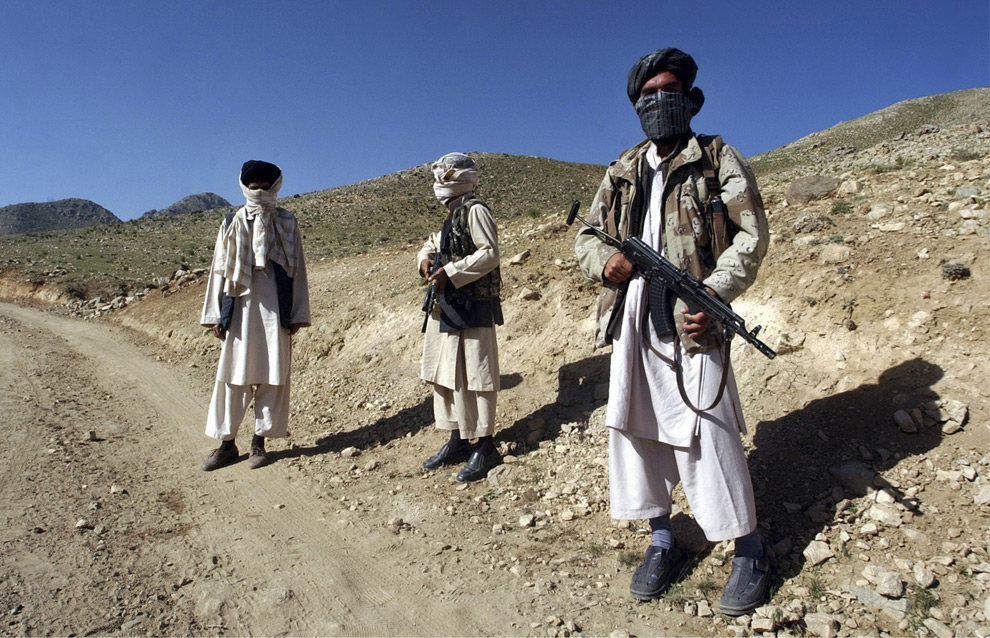 Overview
Overview
While the politicians talk about war in Iraq, there is that other country that we invaded and stuff is still happening there. Since 200,1 the Taliban has regained some influence in the south of the country – although the marines recently won a major victory. Further, opium production has been unchecked by anything but market forces and the government seems no more organized or in charge as it did years ago. Since tens of thousands of US troops are still fighting to stabilize a nation and this war – for some reason – is much more popular than the Iraq war (despite the fact it too may be worthy of the moniker “quagmire”), this brief is going to reexamine what is going on in Afghanistan and what that means for that country, the region and the US.
Key Terms and Figures
Hamid Karzai: He is the current president of Afghanistan. He has seen declining public support due to increased violence and support for the Taliban. He largely blames NATO for the fact that the Taliban has not been defeated.
NATO: There are currently approximately 50,000 NATO troops in Afghanistan, 2/3 of which are American. Their primary missions are to train the Afghani military (currently about 57,000 strong) and to help stabilize the country
Taliban: While over the last few days the Taliban has been routed from some of its strongholds in southern Afghanistan, their ability to freely move into Pakistan has made it difficult for NATO to entirely eradicate this organization. Furthermore, as civilians grow weary of NATO occupation and a lack of governmental efficacy, more Afghanis are supporting this group. This makes it harder for the military to work as it lacks support and also decreases the control the government can exert outside of Kabul.
Pakistan: While Pakistan under the control of Mushareff was largely opposed to the Taliban, the new administration has begun talks with Taliban – and their supporting groups – within Pakistan. This legitimacy, combined with the inability of Pakistan to fully secure its border with Afghanistan, has made it easy for the Taliban to have the safety and support it needs to prosecute its campaigns in Afghanistan.
Major Issues
Canada: Canada has been one of the primary leaders of the NATO mission in Afghanistan. However, as deaths have mounted there has been increasing pressure in that nation to lessen their involvement in the conflict. While this war was generally seen as just in the eyes of the international community, the growing resentment for the conflict in non-US members of the NATO coalition suggests that more of the responsibility of for the conflict may fall on the shoulders of the US government. Basically, Canadian discomfort with fighting in Afghanistan is a good indicator that global support is beginning to see this conflict as becoming bogged down and a liability rather than a good rebuilding mission. However, despite this waning support the conflict is still more popular than the Iraq war, still having firm commitments from many nations including Poland and Germany – who both oppose Iraq, despite their relative similarities in everything but scale.
Rhetorical Differences (the impact in the US): One of the most astounding things about the conflict in Afghanistan is the fact that the American public still largely approves of this conflict. While most of the rebuilding goals and timelines are running way behind, neither the media nor the population at large seems to care. This can be attributed to two primary factors: first, the Iraq war simply eclipses this one in terms of scope, violence and initial opposition, and second the American public had a much clearer picture of why this war started – so they are willing to take it as far as they need to go. It’s still seen as a moral war. The primary implication of this rhetorical difference from Iraq is that politicians really don’t have to address the issue. While this keeps it out of the election cycle, it also keeps it out of the public eye – meaning that there is less oversight when things do go wrong. So while the public commitment does help ensure that the military should get the support it needs to fight the war, it also means that necessary oversight may be lost.
Poppies: One of the biggest problems with the invasion is that the removal of the Taliban made poppies – the primary ingredient in opium and heroin – much easier for Afghani farmers to grow. This illicit crop has been one of the main factors fueling the economy. While the NATO coalition has been largely committed to eradicating this crop, they have been largely unsuccessful. The only time that production has decreased is over this most recent growing season, where food shortages have made wheat more economically valuable than poppies. So while NATO or the government couldn’t stamp out this crop, it seems their inability to stabilize the nation or the agricultural industry may have created the market vacuum that will move farmers away from narcotics.
Sample Question
Should the election focus more on Afghanistan?
Is NATO defeating the Taliban?
Can NATO count on Pakistan as an ally against the Taliban?
Will Canada stay militarily involved in Afghanistan?
Is Karzai losing his control of the Afghani government?

